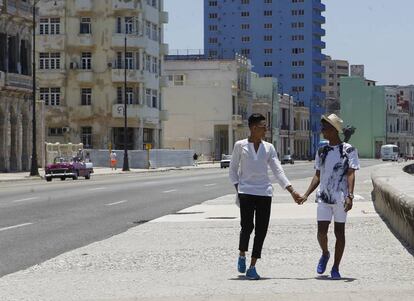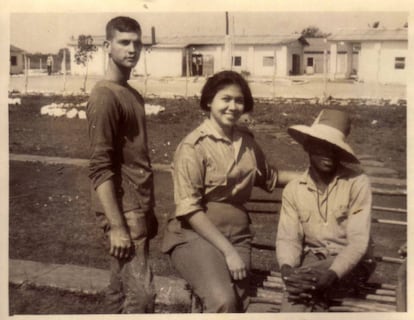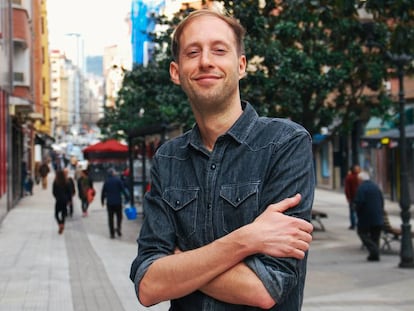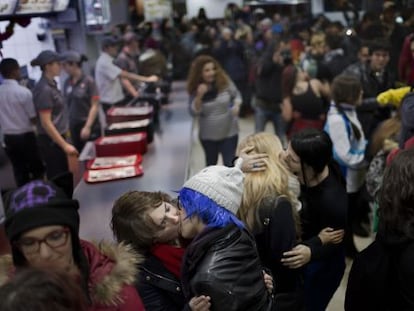After decades of homophobia, Cuba closer to allowing same-sex marriage
The Cuban government has approved changes to the constitution that would allow gay couples to be married


Cuba¡¯s National Assembly has agreed to constitutional reform that would allow same-sex marriage on the island. The draft reform was approved on Sunday and will be put to a popular vote later this year. If approved, marriage would be redefined as a ¡°union between two people¡± instead of a union between a man and a woman.
Homophobic bullying is very common and there is no type of prevention
LGTBQ activist Isbel Torres
¡°With this proposal for constitutional regulation, Cuba puts itself among the world¡¯s leading countries in terms of recognizing and guaranteeing human rights,¡± said deputy Mariela Castro, the daughter of former president Ra¨²l Castro and an active spokesperson for LGTBQ rights. Castro, who heads Cuba¡¯s National Center for Sex Education, said the changes could also lay the foundation to ultimately allow same-sex couples to adopt children. ¡°The state must guarantee all families this right and the means to reach these ends,¡± she explained.
Another deputy, Yolanda Ferrer, said that sexual diversity ¡°is a right, not a stigma¡± and called for the country to move away from the ¡°backward years¡± of the 1970s, when homosexuals were sent to labor camps. Deputy Miguel Barnet also expressed his ¡°immense pride¡± at the proposed reform, arguing Cuba ¡°is inaugurating a new area. This is a dialectic and modern constitution.¡±

The LGBTQ community in Cuba has welcomed the move, but indicated in comments on social media that greater political freedom is also needed on the island.
The constitutional reform does not include any change to the political system, where the Communist Party remains the only legal party. While the reference to communism as the ideal model is gone, the constitution imposes ¡°the irrevocability of socialism.¡± The text, unanimously approved by the 605 deputies in the National Assembly, also recognizes private property and introduces the figure of a prime minister. The draft constitution will be put to a popular vote between August 13 and November 15, before being finally approved in a referendum, the date of which is yet to be announced.
LGBTQ activist Isbel Torres said he was surprised but ¡°very pleased¡± with the reform to recognize same-sex marriage. ¡°I thought the more backward forces within the government would have the power to prevent it, but luckily this hasn¡¯t been the case,¡± he told EL PA?S by phone. ¡°Cuba continues to be a pretty homophobic country, more so in the countryside than in the capital,¡± he explained. ¡°But there is a lot of homophobia, especially transphobia, and within the police and army this homophobia is expressed in a terrible way. At school as well. Homophobic bullying is very common and there is no type of prevention.¡±
History of torture

One of the darkest chapters for the LGBTQ community under Castro was in connection with the Military Units to Aid Production (UMAP), which operated between 1965 and 1968. These units were forced labor camps designed to ¡°reeducate¡± anyone the Castro regime considered to be against the government, such as criminals, political and religious dissidents and gay people. As estimated 30,000 individuals were sent to the camps, including 800 members of the LGBTQ community.
Historian Abel Sierra Madero, an expert on these camps, told EL PA?S that they were torture centers and criticized the Cuban government for never apologizing for their existence. ¡°They have always tried to make it seem that what happened at the UMAPs was a mistake, and Fidel Castro avoided taking responsibility by saying he was very busy governing and didn¡¯t know what was happening there.¡±
¡°But they were not an isolated mistake. The UMAPs were a systemic phenomenon of the revolution,¡±? he added.
Emilio Izquierdo, director the UMAP Miami association, a group that works to report the abuse that went on at these centers. himself spent two years in an UMAP in Camag¨¹ey province as a political dissident. He argues that what happened at the centers was a ¡°crime against humanity¡± and says that homosexual prisoners were treated especially cruelly: ¡°They separated them from the rest and put together work teams with just gay people, dividing the groups into those who were active and passive, and subjecting them to all manner of insults, beatings and lockups.¡±
Gay couple kicked out of bar in Havana for taking photo

Homophobia continues to be a major problem in Cuba. In one recent case of discrimination, Brian Canelles and his partner Ari¨¢n Abreu were asked to leave the fashionable bar EFE in the capital, Havana, after taking a photo of themselves kissing. Canelles told local magazine El Estornudo that a worker at the bar did not want the "photo to be published." When asked what they were referring to, the worker explained "the bar isn't interested in the gay public. We don't want that reputation," according to Canelles.
The case has been widely criticized with even Mariela Castro stepping in to review what happened. Two days after the incident, Cuba's Official Gazette published a decree outlining that any private business found to discriminate against clients based on their gender or sexual orientation would be fined 1,000 Cuban pesos (around €65) and shut down.
English version by Melissa Kitson.
Tu suscripci¨®n se est¨¢ usando en otro dispositivo
?Quieres a?adir otro usuario a tu suscripci¨®n?
Si contin¨²as leyendo en este dispositivo, no se podr¨¢ leer en el otro.
FlechaTu suscripci¨®n se est¨¢ usando en otro dispositivo y solo puedes acceder a EL PA?S desde un dispositivo a la vez.
Si quieres compartir tu cuenta, cambia tu suscripci¨®n a la modalidad Premium, as¨ª podr¨¢s a?adir otro usuario. Cada uno acceder¨¢ con su propia cuenta de email, lo que os permitir¨¢ personalizar vuestra experiencia en EL PA?S.
En el caso de no saber qui¨¦n est¨¢ usando tu cuenta, te recomendamos cambiar tu contrase?a aqu¨ª.
Si decides continuar compartiendo tu cuenta, este mensaje se mostrar¨¢ en tu dispositivo y en el de la otra persona que est¨¢ usando tu cuenta de forma indefinida, afectando a tu experiencia de lectura. Puedes consultar aqu¨ª los t¨¦rminos y condiciones de la suscripci¨®n digital.










































